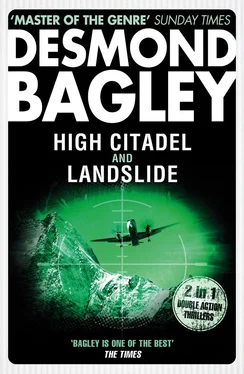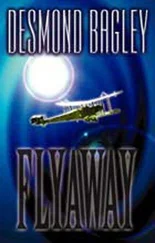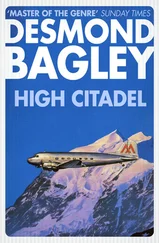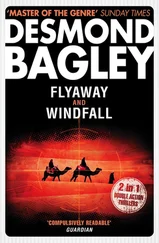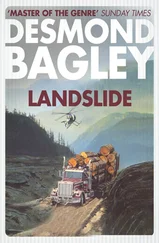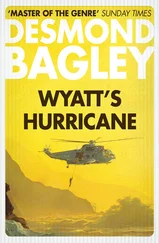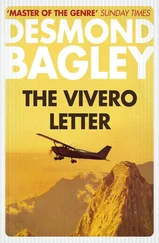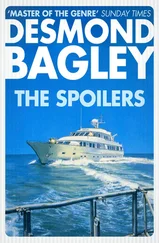When he pulled his battered car into the parking bay he looked with interest at the unaccustomed bright lights of the airport. The field was low-grade, classed as an emergency strip by the big operators, although to Filson it was a main base. A Samair Boeing 727 lay sleekly in front of the control tower and O’Hara looked at it enviously for a while, then switched his attention to the hangar beyond.
A Dakota was being loaded and, even at that distance, the lights were bright enough for O’Hara to see the emblem on the tail – two intertwined ‘A’s, painted artistically to look like mountain peaks. He smiled gently to himself. It was appropriate that he should fly a plane decorated with the Double-A; alcoholics of the world unite – it was a pity Filson didn’t see the joke. But Filson was very proud of his Andes Airlift and never joked about it. A humourless man, altogether.
He got out of the car and walked around to the main building to find it was full of people, tired people rudely awakened and set down in the middle of nowhere in the middle of the night. He pushed his way through the crowd towards Filson’s office. An American voice with a Western twang complained loudly and bitterly, ‘This is a damned disgrace – I’m going to speak to Mr Coulson about it when I get back to Rio.’
O’Hara grinned as he pushed open the door of the office. Filson was sitting at his desk in his shirt-sleeves, his face shiny with sweat. He always sweated, particularly in an emergency and since his life was in a continual state of crisis it was a wonder he didn’t melt away altogether. He looked up.
‘So you got here at last.’
‘I’m always pleased at the welcome I get,’ observed O’Hara.
Filson ignored that. ‘All right; this is the dope,’ he said. ‘I’ve contracted with Samair to take ten of their passengers to Santillana – they’re the ones who have to make connections with a ship. You’ll take number one – she’s being serviced now.’ His voice was briskly businesslike and O’Hara could tell by the way he sonorously rolled out the words ‘contracted with Samair’ that he saw himself as a big-time air operator doing business with his peers instead of what he really was – an ageing ex-pilot making a precarious living off two twenty-five-year-old rattling ex-army surplus planes.
O’Hara merely said, ‘Who’s coming with me?’
‘Grivas.’
‘That cocky little bastard.’
‘He volunteered – which is more than you did,’ snapped Filson.
‘Oh?’
‘He was here when the 727 touched down,’ said Filson. He smiled thinly at O’Hara. ‘It was his idea to put it to Samair that we take some of their more urgent passengers, so he phoned me right away. That’s the kind of quick thinking we need in this organization.’
‘I don’t like him in a plane,’ said O’Hara.
‘So you’re a better pilot,’ said Filson reluctantly. ‘That’s why you’re skipper and he’s going as co-pilot.’ He looked at the ceiling reflectively. ‘When this deal with Samair comes off maybe I’ll promote Grivas to the office. He’s too good to be a pilot.’
Filson had delusions of grandeur. O’Hara said deliberately, ‘If you think that South American Air is going to give you a feeder contract, you’re crazy. You’ll get paid for taking their passengers and you’ll get their thanks – for what they’re worth – and they’ll kiss you off fast.’
Filson pointed a pen at O’Hara. ‘You’re paid to jockey a plane – leave the heavy thinking to me.’
O’Hara gave up. ‘What happened to the 727?’
‘Something wrong with the fuel feed – they’re looking at it now.’ Filson picked up a sheaf of papers. ‘There’s a crate of machinery to go for servicing. Here’s the manifest.’
‘Christ!’ said O’Hara. ‘This is an unscheduled flight. Do you have to do this?’
‘Unscheduled or not, you’re going with a full load. Damned if I send a half empty plane when I can send a full one.’
O’Hara was mournful. ‘It’s just that I thought I’d have an easy trip for a change. You know you always overload and it’s a hell of a job going through the passes. The old bitch wallows like a hippo.’
‘You’re going at the best time,’ said Filson. ‘It’ll be worse later in the day when the sun has warmed things up. Now get the hell out of here and stop bothering me.’
O’Hara left the office. The main hall was emptying, a stream of disgruntled Samair passengers leaving for the antiquated airport bus. A few people still stood about – those would be the passengers for Santillana. O’Hara ignored them; passengers or freight, it was all one to him. He took them over the Andes and dumped them on the other side and there was no point in getting involved with them. A bus driver doesn’t mix with his passengers, he thought; and that’s all I am – a bloody vertical bus driver.
He glanced at the manifest. Filson had done it again – there were two crates and he was aghast at their weight. One of these days, he thought savagely, I’ll get an I.A.T.A. inspector up here at the right time and Filson will go for a loop. He crushed the manifest in his fist and went to inspect the Dakota.
Grivas was by the plane, lounging gracefully against the undercarriage. He straightened when he saw O’Hara and flicked his cigarette across the tarmac but did not step forward to meet him. O’Hara crossed over and said, ‘Is the cargo aboard?’
Grivas smiled. ‘Yes.’
‘Did you check it? Is it secure?’
‘Of course, Señor O’Hara. I saw to it myself.’
O’Hara grunted. He did not like Grivas, neither as a man nor as a pilot. He distrusted his smoothness, the slick patina of pseudo good breeding that covered him like a sheen from his patent leather hair and trim toothbrush moustache to his highly polished shoes. Grivas was a slim wiry man, not very tall, who always wore a smile. O’Hara distrusted the smile most of all.
‘What’s the weather?’ he asked.
Grivas looked at the sky. ‘It seems all right.’
O’Hara let acid creep into his voice. ‘A met. report would be a good thing, don’t you think?’
Grivas grinned. ‘I’ll get it,’ he said.
O’Hara watched him go, then turned to the Dakota and walked round to the cargo doors. The Dakota had been one of the most successful planes ever designed, the work-horse of the Allied forces during the war. Over ten thousand of them had fought a good war, flying countless millions of ton-miles of precious freight about the world. It was a good plane in its time, but that was long ago.
This Dakota was twenty-five years old, battered by too many air hours with too little servicing. O’Hara knew the exact amount of play in the rudder cables; he knew how to nurse the worn-out engines so as to get the best out of them – and a poor best it was; he knew the delicate technique of landing so as not to put too much strain on the weakened undercarriage. And he knew that one day the whole sorry fabric would play a murderous trick on him high over the white spears of the Andes.
He climbed into the plane and looked about the cavernous interior. There were ten seats up front, not the luxurious reclining couches of Samair but uncomfortable hard leather chairs each fitted with the safety-belt that even Filson could not skip, although he had grumbled at the added cost. The rest of the fuselage was devoted to cargo space and was at present occupied by two large crates.
O’Hara went round them testing the anchoring straps with his hand. He had a horror that one day the cargo would slide forward if he made a bad landing or hit very bad turbulence. That would be the end of any passengers who had the ill-luck to be flying Andes Airlift. He cursed as he found a loose strap. Grivas and his slipshod ways would be the end of him one day.
Читать дальше
